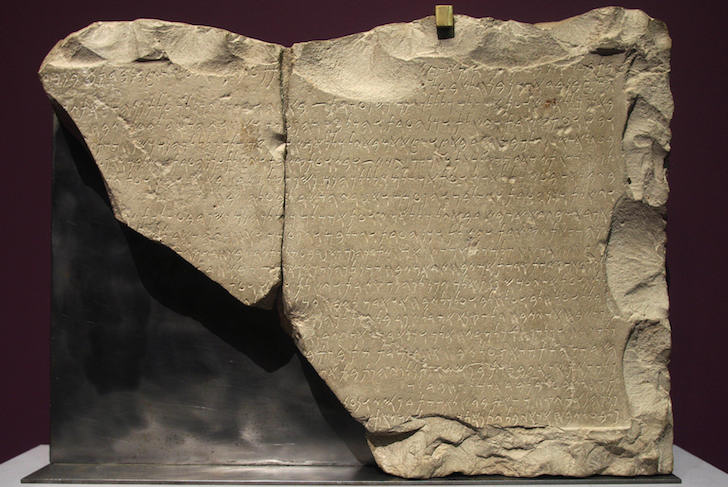So the Phoenicians never existed. Herodotus, that unreliable old fibber, made it all up in the Histories. Is this really what Josephine Quinn is saying, or is it just a cunning ruse to stir up a fuss and infuriate the dwindling band of Herodoteans out there?
Because Quinn, a professor of ancient history at Oxford University, declares that her mission is not so much to rescue the Phoenicians from their ‘undeserved obscurity’ so much as to argue that there were no such people. ‘It is modern nationalism that has created the Phoenicians,’ she writes, citing 19th-century French, English and German historians who spoke of the Phoenician ‘people’ and ‘nation’ in the age of the nation state.
The Phoenicians are those murkiest and most elusive of prehistorical characters, which is perhaps excusable in a community that existed from around 1,500–300 BC and left little in the way of literary or archaeological evidence. Classicists don’t tend to give them much of a look in. Last summer I joined John Julius Norwich lecturing on a ship. His talk on the history of the Mediterranean, from ancient times to the cruise-ship desecration of today, was a tour de force. Confessing to a lack of interest in the Phoenicians, he gave them just the briefest of cameos. Blink and you’d miss them. The glories of Ancient Greece and Rome still carry all before them.
And yet there they are at the heart of ancient Mediterranean history, some kind of confederation of irrepressible maritime traders and explorers based in the eastern Mediterranean with major cities in Byblos, Berytus (Beirut), Tyre, Sidon and Arwad. They make their entrance onto the literary-historical stage with a first-page mention in the Histories of Herodotus, the 5th century BC father of history. He writes that they came originally from the Red Sea, entered and settled in the Mediterranean and immediately began ‘to adventure on long voyages, freighting their vessels with the wares of Egypt and Assyria’.
Their influence was intellectually and geographically pervasive, apparently teaching the Greeks the alphabet and establishing the famous Phoenician settlement of Carthage. ‘They have been credited with discovering everything from the pole star to Cornish cream,’ Quinn writes, noting their acumen as traders in cedar from Mount Lebanon, together with beautifully worked metal, ivory and glass. Both the Old Testament and the Iliad pay tribute to Phoenician artistry: in the construction and decoration of Jerusalem’s temple of Solomon and the world’s most beautiful silver mixing bowl, a prize for the funeral games of Patroklos, respectively.
In Search of the Phoenicians explores the links that connected these people, language and religion foremost among them, while emphasising the absence of ties based on nationhood and ethnicity. To the extent that we can gauge how Phoenicians looked at themselves, ties and communities were more based on cities, families and religious practices than on anything else. The cult of the Tyrian god Melqart, for instance, known to Greeks as Herakles, tied together Phoenician settlements throughout the Mediterranean, in addition to the Greek diaspora. The child-sacrifice cult of Baal Hammon (Kronos in Greek, generally Saturn in Latin) seems not to have caught on to the same degree.
No one called themselves ‘Phoenician’ in Phoenician, not least because phoenix is a Greek word — for palm tree. From all the available evidence, the first person to identify himself as Phoenician was the writer Heliodorus from Emesa (in what is today the Syrian city of Homs) in the 4th century.
Quinn’s story is most compelling when she plays to her strengths as a historian and archaeologist (she is co-director of excavations at the Tunisian site of Utica), discussing who the Phoenicians might have been, trawling through the assorted archaeological, artistic, linguistic, literary, religious, epigraphic and numismatic evidence — or lack of it — to develop a clearer view of this shadowy people. She leaves no stone unturned, from archaeological ruins and funerary inscriptions to poetry and drama, in her quest to understand how Phoenicians have, perhaps only after their time, become a people.
She concludes that there has been a lot of ‘exciting’ work about identity in recent decades, but too little on ‘the concept of identity’. Some might counter that the whole field of academic-led navel gazing has never been in ruder health. The danger of plunging into a long-winded debate about ‘multiple, fragmented and fluid’ identities is that it takes us away from the historical narrative prose favoured by the general reader into the sociological jargon preferred by the specialist. And language matters. ‘Herodotus’ prose’, remarked Aubrey de Sélincourt, one of the most elegant translators of the Histories, ‘has the flexibility, ease and grace of a man superbly talking’. Few historians have ever matched it.
Ultimately, Quinn is surely right to resist an anachronistic nationhood foisted onto this ancient geographically and culturally diverse community. But one might argue that she is as insistent on a malleable, fluid identity today as the 19th-century European nationalists were with their definition of the Phoenicians as a people. Which is no more than to observe that we are all a product of our times — from the high-spirited Herodotus to today’s careful academics.






Comments